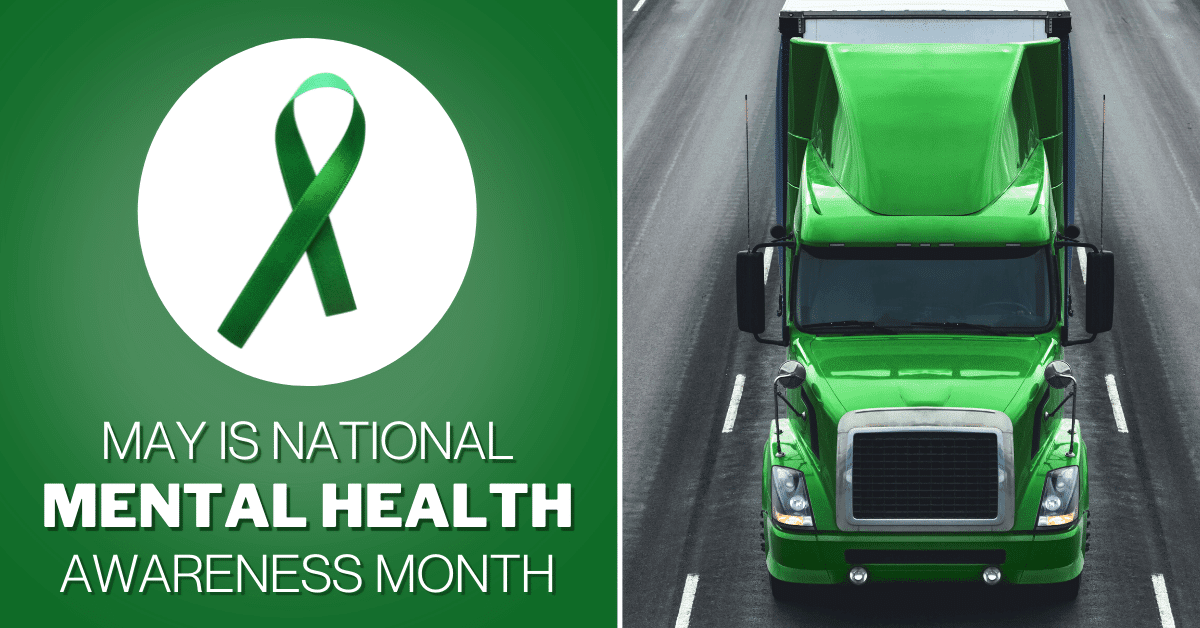
Mental Health Awareness Month for Truck Drivers

May is Mental Health Awareness Month
Mental health issues are a daily battle for millions of people and truck drivers are no exception. Mental Health is an issue that is not always discussed within the trucking industry, however bringing awareness to the struggles that come with having a mental health issue as a truck driver is very important.
Truck driving is a solitary job. Some would suggest it’s lonely, but to many of us, that simply isn’t the case. We enjoy our time alone. There’s no better company than our own and this works well for our innate nature as introverts. We don’t want small talk…that’s exhausting and superficial. But give us that chance to have a deeper, more meaningful discussion about what matters to us and we will go all in. But it seems many people aren’t ready for that so we stay in our trucks and keep to ourselves.
In the world of truck driving the narrative often shifts to the physical health of drivers. The sedentary nature of the job most certainly affects the wellbeing of the driver, but there is also a side of our health that is spoken of in whispers, coupled with denial, or shame and embarrassment. But not today!
Many health risks are associated with trucking, both physical and mental. In a recent study, 75% of truck drivers report that their work is stressful, and 71% say the same about their life outside the truck. Combine those sentiments with long hours on the road, disrupted sleep, time away from family, demands from shippers and receivers, the push from dispatch, and of course all the other drivers, can take a toll on the best of us. We see a rise in sleep apnea, drug use and addiction, alcohol use and addiction, obesity, high blood pressure, circulation issues, heart issues. Your mental health and wellbeing are impacted as well.
The vast majority of truck drivers are men, and with that come many issues that are connected to men across professions. Frankly, men don’t like to talk about their feelings. Sometimes we don’t know how to label them, what to call them, or how to handle them. So we stay quiet. This often results in problems not being addressed and worsening over time. A 12-year long study from Monash University showed that more than half of all truck drivers suffer from psychological distress. Further studies have shown consistently that men, compared to women, have feelings of shame when it comes to speaking about their stress and anxiety.
In the US, truck driving consistently lands in the top ten highest-risk occupations. Truck drivers are ranked fifth highest for work-related suicide with suicide cited as the second leading cause of death among truck drivers under the age of 40.
Being alone, one of the greatest benefits of truck driving, can turn to loneliness. Left unchecked, the risk of developing challenges related to mental health will increase.
Consider these warning signs:
● You have a short fuse
● You get easily angered
● Appetite changes
● Weight loss or gain
● Increased fatigue
● Feelings of worthlessness or guilt
● Difficulties with concentration
● Thoughts of suicide or death
If you see yourself on this list, seek support and assistance.
National Suicide Prevention Lifeline 1-800-273-8255
Canada Suicide Prevention 1-833-456-4566
For a friendly conversation that isn’t specific to your mental health and wellbeing, call the Trucker’s Talk Line at 1-833-883-4388




